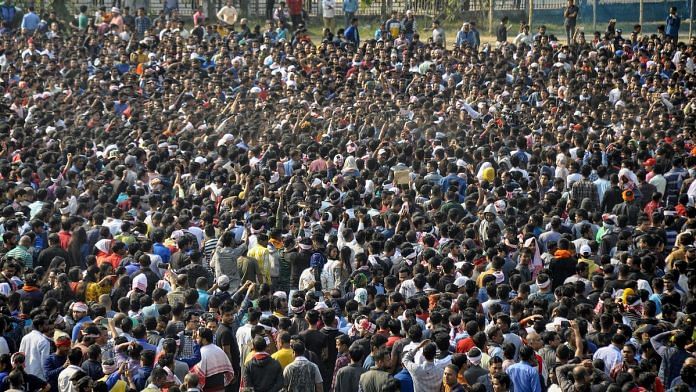The past one week has seen Assam go back in time, with the Citizenship (Amendment) Bill reigniting old fury, fire and fears. Now an act, this contentious plan has re-opened Assam’s old wounds, brought back memories of the tumultuous insurgency years and essentially, propelled the northeast state — now used to relative calm and quiet — into headlines for violence and civil unrest again.
And that is why Assam is ThePrint’s newsmaker of the week.
Assam is no stranger to disorder, having witnessed a mass agitation against ‘illegal’ immigrants that began in 1979 and ended with the signing of the Assam Accord in 1985. The years that followed saw insurgency at its peak in the state, with the United Liberation Front of Assam (ULFA) leading a violent movement against the influx of ‘outsiders’ – the Bengali, Hindi as well as Bihari-speaking people.
The violent years made Assam a dreaded destination, earning it the reputation of being a turbulent state. It was early 2000s onward, however, that insurgency began to reduce, normalcy returned and Assam started its march towards a ‘regular’ state, with ‘regular’ aspirations, demands and way of life.
Also read: Indefinite curfew in Guwahati, Army in Assam— citizenship bill plunges Northeast in chaos
Grim reminder of the past
With the organic, deep-rooted opposition to the amended Citizenship Act, Assam is now back to a point where it feels alienated and wronged by the Centre, and ‘mainland’ India.
The law would be less potent, but for the backdrop of the National Register of Citizens (NRC) recently updated in the state. The NRC identifies those who immigrated to Assam illegally from Bangladesh post 24 March 1971 — a long-standing demand of the indigenous people and one that was laid down in the Assam Accord.
The ethnic Assamese have held a long-standing resentment towards the ‘outsider’ — irrespective of ethnicity, religion or citizenship. What the new law essentially does is segregate the 19-odd lakh people left out of the NRC into Hindu and Muslim refugees, promising to grant citizenship to the former, which happens to be incompatible with the demands of the state.
What it also does is expose the young generation to the same ire and ethnic insecurity that overwhelmed the Assamese people in the 1970s, 1980s, as well as 1990s. With the NRC and Citizenship law now coming to the state back-to-back, even this generation has been made vulnerable to a feeling that was fading and, in many cases, even forgotten.
Also read: Assam’s fears rooted in history, unlike the communal spin Indian ‘intellectuals’ gave to CAB
Fodder for unrest
This fresh wave of anxiety also can serve as fertile ground for reviving insurgency and deep-seated unrest. The ULFA has been a pale shadow of its earlier self for a while, but with this fresh impetus, it can potentially come back.
The new law has wide acceptance in the Barak Valley — home primarily to Hindus of Bengali-origin. In the Sixth Schedule areas as well, the Act is not being seen as a threat anymore following their exemption.
This makes the Brahmaputra Valley, particularly upper Assam districts like Dibrugarh and Lakhimpur as well as the main city of Guwahati, a concentrated region for the revival of the decades-old movement.
What, however, should not be forgotten is that the Citizenship (Amendment) Bill has always been part of the BJP’s agenda, despite which Assam voted for the party in the 2016 assembly elections. Moreover, even after the BJP brought the bill to Parliament in the first term of the Prime Minister Narendra Modi-led government, Assam overwhelmingly voted for the party in the 2019 Lok Sabha polls.
Also read: Modi’s CAB proves that concerns & fears of northeast people don’t matter in Indian politics
Assam’s opposition vs that of others
Interestingly, the opposition by the Assamese people and those outside to the new citizenship law brings out the paradox of the situation.
While Assam opposes the Act because it wants all ‘illegal’ immigrants to be kept out (irrespective of religion), many who are against the Act want all refugees to be given refuge (irrespective of religion).
So, even as Assam hits national headlines, the rest of India perhaps barely understands this very significant nuance.




Assam for Assamese, bengal for bengali, so bongali have a state and a country named Bangladesh . So they should live there
whether it is demonetization, CAA and CRC, the Kuan ka Mendak had no ides of its consequence and the country that voted him is paying for it. No big deal. It too shall change..
CAA is a Frankenstein created by Modi-Shah
This question is to the above commentators: Why is Bengali the official language in one section of Assam? WHY is it not Assamese? Assam is neither West Bengal and nor Bangladesh.
Fine column by Assamese novelist Ms Arupa Kalita Patangia in the Indian Express today. Expresses the angst and sense of betrayal felt by the Assamese people over CAB. People reposed a lot of trust in Jatiyo Nayak Sarbananda Sonowal.
Ms. Arupa Kalita Patangia’s piece in the Indian Express was an unabashed celebration of the xenophobic attitude of Assamese society vis-a-vis Hindu Bengali refugees arriving from Bangladesh.
Its strange that this murderous xenophobia persists even after seven decades of Independence. Assam has been the site of most inhuman and savage massacres/riots in modern Indian history. The Nellie massacre of 18 February, 1983 is an example. More than 10,000 innocents were murdered in a single day of rioting. The Tiwari Commission report on the incident has been kept under wraps till date by the Assam state govt.
Who orchestrated such riots and whose well-trained cadres executed the “plans” perfectly is well known across Assam. Unfortunately, the innocent victims of such gruesome acts will never get justice.
Assam has grievance against bengali muslims also. Nelie was result of that. Which is also true considering the no reason for Islam followers from neighboring countries to enter India.